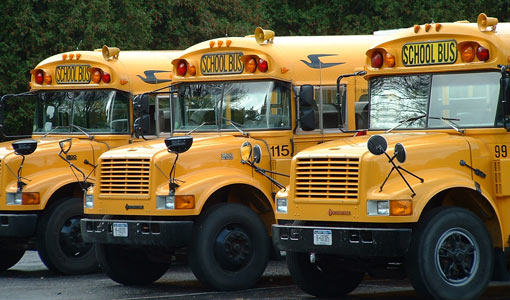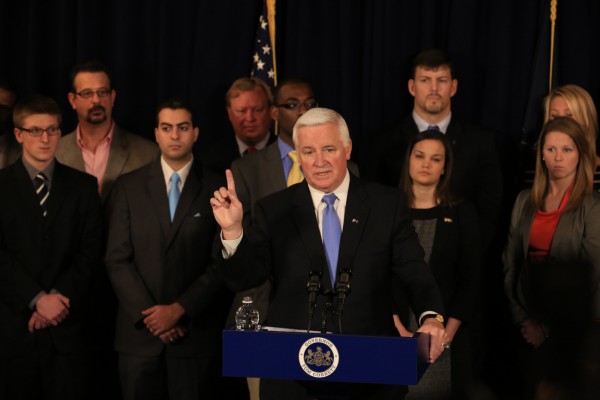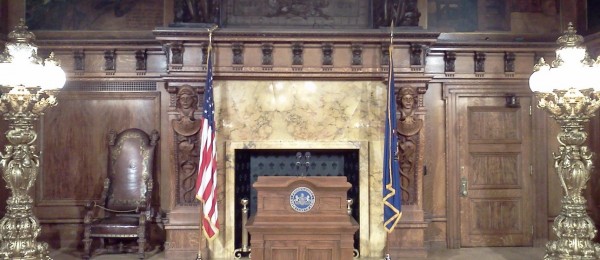Posts
Governor Tom Corbett on Education Funding in his Proposed Budget
/in Ask the Governor, News, Video /by PAMattersRadio PA Roundtable 02.07.13
/in Audio, Media, News, Radio PA Roundtable /by PAMattersThis week, on a special edition of Radio PA Roundtable, Brad Christman & Matt Paul break down key portions of Governor Tom Corbett’s budget address, including plans for education, pension reform and road & bridge funding.
Radio PA Roundtable is a 30-minute program featuring in-depth reporting on the top news stories of the week.
Click the audio player below to hear the full broadcast:
[audio:https://s3.amazonaws.com/witfaudio/radiopa/Roundtable02-08-13.mp3]Corbett Budget Gets Mixed Reviews from Advocates for Children
/in News /by PAMattersWhile the state’s largest teacher’s union says the Governor’s budget fails students again, another group sees signs of encouragement. Pennsylvania Partnerships for Children says the budget begins to restore some cuts to core programs.
CEO Joan Benso says they were pleased to see increases for Pre-K Counts and Head Start Supplemental Assistance. She says it’s a turn in direction, indicating the Governor wants to make some important investments in children.
Benso is also encouraged by additional funding to do outreach for the Children’s Health Insurance Program. She says the state has seen its child population in Medicaid decline.
The budget also calls for 90 million more for basic education, but Wythe Keever, a spokesman for the Pennsylvania State Education Association, says that doesn’t begin to fill the hole created since Governor Corbett took office.
Keever is not impressed with the administration’s argument that it inherited an education budget backfilled with one-time federal stimulus money. He says budgeting is about choices and the Governor chose not to replace the stimulus funding.
Keever adds that the governor’s pension reform proposal asks teachers and other public employees to shoulder the burden, when they didn’t create the problem with the pension system. He says new employees would be paying more for a lesser benefit.
The Association is not a fan of the governor’s proposal to privatize state liquor sales and create a four-year education grant program with the proceeds. Keever says the governor is proposing to spend money he doesn’t have yet. He says privatization is far from a done deal; it’s been proposed many times over the last two decades in the General Assembly.
A privatization effort failed to get enough support for a vote in the last session and some lawmakers favor modernization instead.
Governor Tom Corbett Proposes 2.4% Spending Increase for 2013-2014
/in News /by Brad ChristmanGovernor Tom Corbett has presented his general fund budget proposal for the 2013-2014 fiscal year that begins on July 1st. He calls it a balanced budget with no tax increases. Corbett’s plan calls for the state to spend $678.76 million more than it has in the current budget, an increase of 2.4%. In his budget address, the governor also laid out his plans for pension reform and transportation infrastructure.
Highlights of the budget include the first increase in basic education funding in two years. The 1.7% increase amounts to about $90 million. Additionally, the governor is proposing a block grant program to be funded by the state’s divestiture in the liquor business. That funding, which would total $1 billion over four years, could be earmarked for school safety, K-3 readiness and enhancing access to STEM programs (science, technology, engineering and mathematics), among other programs. The governor says there would be an initial $200 million available for the grants by the 2014-2015 school year.
Governor Corbett’s proposal also eliminates the Capital Stock & Franchise Tax on January 1, 2014, and calls for a reduction of the Corporate Net Income tax to 6.99% over ten years from 2015-2025. That CNI tax is currently 9.99%.
The budget plan also includes $14.7 million for three new State Police cadet classes.
On pension reform, the governor is proposing big changes for the two public pension funds that have been declared in a state of crisis. The State Employees Retirement System (SERS) and the Public School Employees Retirement System (PSERS) are both drastically underfunded and threaten to gobble up massive pieces of future state budgets. Among the changes proposed by Governor Corbett, new employees would be automatically enrolled in a 401(a) retirement plan where they will be required to contribute at least 6.25% of their salary (7.5% for PSERS). The governor says current employees would not see any changes to benefits already accrued and current retirees would see no changes at all in the benefits they are collecting. SERS is currently only 65.3% funded while PSERS is 69.1% funded.
On transportation funding, the governor is proposing removing a cap on the Oil Company Franchise Tax. Currently, distributors pay that tax based on the artificial cap of $1.25 per gallon, wholesale. Gas prices, of course, are well beyond that threshold, and the governor wants to “uncap” that price over a 5-year phase-in. Distributors would pay more in taxes under the plan, but to offset any potential attempts to pass along that increase to consumers, the governor also wants to lower the state tax on gasoline by a penny per gallon in 2013-14 and another cent in 2014-15. The current state gasoline tax is 12 cents per gallon.
Next up, the overall spending plan will be the subject of dozens of legislative budget hearings in the coming weeks. Then legislative leaders will carve out a final budget that will be sent to the floors of the House and Senate, probably in late June.
Radio PA Roundtable 02.01.13
/in Audio, Media, News, Radio PA Roundtable /by PAMattersOn this week’s Radio PA Roundtable, Brad Christman & Matt Paul bring you the governor’s plan to privatize liquor sales in Pennsylvania and the reaction from opponents of the plan. Also, a fight over cyber charter school funding…
Radio PA Roundtable is a 30-minute program featuring in-depth reporting on the top news stories of the week.
Click the audio player below to hear the full broadcast:
[audio:https://s3.amazonaws.com/witfaudio/radiopa/Roundtable02-01-13.mp3]Governor Corbett Lays Out Liquor Privatization Plan
/in News /by PAMattersGovernor Tom Corbett wants to transition Pennsylvania out of the liquor business over a four year period and use the proceeds for education. The privatization plan would change the distribution of liquor from the wholesale to retail levels.
During the phase in, the governor expects the plan to generate one billion dollars, which would be used to create the Passport to Learning Block Grant Program for public education.
Governor Corbett says he does not simply want to trim the system a little here or there. He says if we are to gain the advantages of greater consumer choice and greater consumer convenience, we should not do it half way.
The Governor added that the plan includes tax credits for businesses that employ separated LCB workers, educational credits, civil service credits and other efforts to help displaced employees.
The Governor’s plan would double the current number of wine and spirits stores to 1200. It would require new alcohol retailers, such as wine and spirits stores, grocery stores, pharmacies and convenience stores to use an ID scanner device before they can sell alcohol. Fines would be increased for selling to minors and visibly intoxicated persons. The additional money from license surcharges and increased fines would be designated for enforcement efforts.
The Governor also proposes increasing alcohol treatment and prevention efforts.
Governor Corbett released details of the plan surrounded by by a number of state house Republicans. House majority leader Mike Turzai , whose own privatization effort fell short, said there’s a lot of energy in the house. He said the Governor is doing something historical in taking the lead on the issue.
Corbett Struggles in New Quinnipiac Poll
/in News /by PAMattersPennsylvania voters are giving Governor Tom Corbett poor marks half-way through his first term. Today’s Quinnipiac Poll finds that voters disapprove of the job Corbett is doing by a margin of 42 – 36%. That’s down from a 40 – 38% approval rating in November’s Quinnipiac Poll.
Pollster Tim Malloy says there’s no strong base of support for Corbett among any income or age group, or in any region of the state. “It’s halftime in Gov. Tom Corbett’s first term and if he were running a football team instead of a state, he’d fire his offensive coordinator,” Malloy said in a statement.
While 50% of PA voters disapprove of the way Corbett has handled the Penn State scandal over these past 15-months, the poll finds that they do support his lawsuit challenging the NCAA sanctions by a margin of 43 – 37%.
53% of voters say the sanctions – including a four year bowl ban and $60-million dollar fine – were too severe. 13% told pollsters they weren’t severe enough. Meanwhile, voters do have a favorable opinion of the late Joe Paterno (43 – 29%).
Governor Tom Corbett on His Lawsuit Against the NCAA
/in Ask the Governor, Media, News, Video /by PAMattersWelcome to PAMatters.com, a new source for news and commentary from Pennsylvania’s capital. In addition to video, audio and pictures from the stories and events that affect YOU, you’ll also get some behind-the-scenes analysis via blogs from our award-winning staff of journalists.







